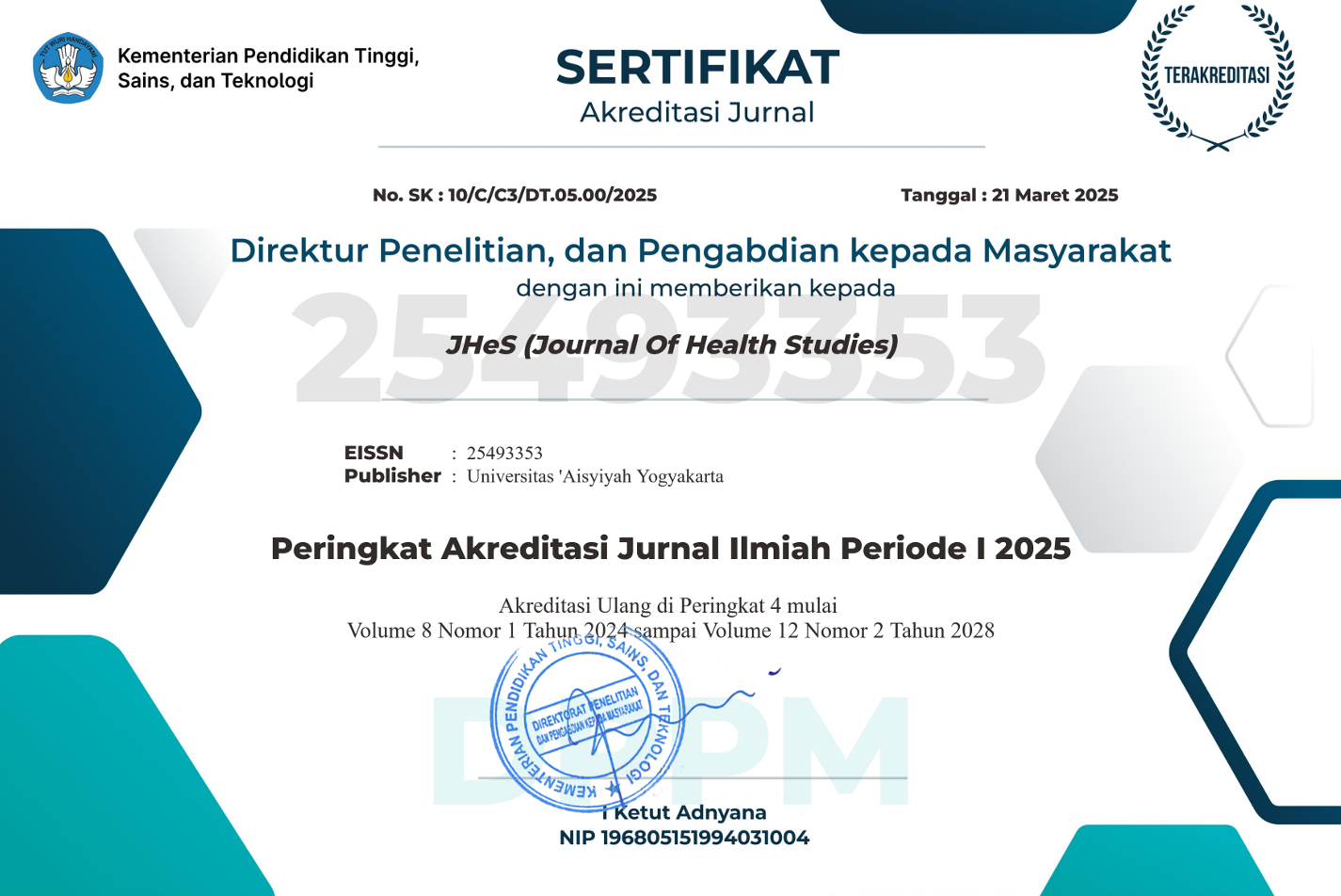Applying Early Warning Score (EWS) in hospitals for adult mortality risk factors
DOI:
https://doi.org/10.31101/jhes.3294Abstract views 544 times
Abstract
Downloads
References
Alam, N., Hobbelink, E. L., van Tienhoven, A. J., van de Ven, P. M., Jansma, E. P., & Nanayakkara, P. W. B. (2014). The impact of using the Early Warning Score (EWS) on patient outcomes: A systematic review. Resuscitation, 85(5), 587–594. https://doi.org/10.1016/j.resuscitation.2014.01.013
Al-Jabri, F., Kvist, T., Sund, R., & Turunen, H. (2021). Quality of care and patient safety at healthcare institutions in Oman: Quantitative study of the perspectives of patients and healthcare professionals. BMC Health Services Research, 21(1), 1109. https://doi.org/10.1186/s12913-021-07152-2
Andersen, L. W., Kim, W. Y., Chase, M., Berg, K. M., Mortensen, S. J., Moskowitz, A., Novack, V., Cocchi, M. N., Donnino, M. W., & American Heart Association’s Get With the Guidelines(®) – Resuscitation Investigators. (2016). The prevalence and significance of abnormal vital signs prior to in-hospital cardiac arrest. Resuscitation, 98, 112–117. https://doi.org/10.1016/j.resuscitation.2015.08.016
Arévalo-Buitrago, P., Morales-Cané, I., Olivares Luque, E., Guler, I., Rodríguez-Borrego, M. A., & López-Soto, P. J. (2021). The predictive power of early-warning scores used in hospital emergency departments: A systematic review and meta-analysis. Emergencias: Revista De La Sociedad Espanola De Medicina De Emergencias, 33(5), 374–381.
Bell, D., Baker, J., Williams, C., & Bassin, L. (2021). A Trend-Based Early Warning Score Can Be Implemented in a Hospital Electronic Medical Record to Effectively Predict Inpatient Deterioration. Critical Care Medicine, 49(10), e961–e967. https://doi.org/10.1097/CCM.0000000000005064
Credland, N., Dyson, J., & Johnson, M. J. (2018). What are the patterns of compliance with Early Warning Track and Trigger Tools: A narrative review. Applied Nursing Research: ANR, 44, 39–47. https://doi.org/10.1016/j.apnr.2018.09.002
Dagenais, G. R., Leong, D. P., Rangarajan, S., Lanas, F., Lopez-Jaramillo, P., Gupta, R., Diaz, R., Avezum, A., Oliveira, G. B. F., Wielgosz, A., Parambath, S. R., Mony, P., Alhabib, K. F., Temizhan, A., Ismail, N., Chifamba, J., Yeates, K., Khatib, R., Rahman, O., … Yusuf, S. (2020). Variations in common diseases, hospital admissions, and deaths in middle-aged adults in 21 countries from five continents (PURE): A prospective cohort study. The Lancet, 395(10226), 785–794. https://doi.org/10.1016/S0140-6736(19)32007-0
Dewi, B. A. M., Susila, I. M. D. P., & Darmawan3, A. A. K. N. (2020). Pengaruh Penggunaan Adult Early Warning Scoring (AEWS) Terhadap Tingkat Mortalitas di RSUD Bali Mandara. Jurnal Kesehatan Saelmakers PERDANA (JKSP), 3(2), Article 2. https://doi.org/10.32524/jksp.v3i2.223
Eddahchouri, Y., Koeneman, M., Plokker, M., Brouwer, E., van de Belt, T. H., van Goor, H., & Bredie, S. J. (2021). Low compliance to a vital sign safety protocol on general hospital wards: A retrospective cohort study. International Journal of Nursing Studies, 115, 103849. https://doi.org/10.1016/j.ijnurstu.2020.103849
Eddahchouri, Y., Peelen, R. V., Koeneman, M., Touw, H. R. W., van Goor, H., & Bredie, S. J. H. (2022). Effect of continuous wireless vital sign monitoring on unplanned ICU admissions and rapid response team calls: A before-and-after study. British Journal of Anaesthesia, 128(5), 857–863. https://doi.org/10.1016/j.bja.2022.01.036
Eldawlatly, A., Alshehri, H., Alqahtani, A., Ahmad, A., Al-Dammas, F., & Marzouk, A. (2018). Appearance of Population, Intervention, Comparison, and Outcome as research question in the title of articles of three different anesthesia journals: A pilot study. Saudi Journal of Anaesthesia, 12(2), 283–286. https://doi.org/10.4103/sja.SJA_767_17
Elliott, D., Allen, E., Perry, L., Fry, M., Duffield, C., Gallagher, R., Iedema, R., McKinley, S., & Roche, M. (2015). Clinical user experiences of observation and response charts: Focus group findings of using a new format chart incorporating a track and trigger system. BMJ Quality & Safety, 24(1), 65–75. https://doi.org/10.1136/bmjqs-2013-002777
English, M., Mwaniki, P., Julius, T., Chepkirui, M., Gathara, D., Ouma, P. O., Cherutich, P., Okiro, E. A., & Snow, R. W. (2018). Hospital Mortality – a neglected but rich source of information supporting the transition to higher quality health systems in low and middle income countries. BMC Medicine, 16(1), 32. https://doi.org/10.1186/s12916-018-1024-8
Flenady, T., Dwyer, T., Sobolewska, A., Lagadec, D. L., Connor, J., Kahl, J., Signal, T., & Browne, M. (2020). Developing a sociocultural framework of compliance: An exploration of factors related to the use of early warning systems among acute care clinicians. BMC Health Services Research, 20, 736. https://doi.org/10.1186/s12913-020-05615-6
Fox, A., & Elliott, N. (2015). Early Warning Scores: A sign of deterioration in patients and systems. Nursing Management (Harrow, London, England : 1994), 22, 26–31. https://doi.org/10.7748/nm.22.1.26.e1337
Fu, L.-H., Schwartz, J., Moy, A., Knaplund, C., Kang, M.-J., Schnock, K. O., Garcia, J. P., Jia, H., Dykes, P. C., Cato, K., Albers, D., & Rossetti, S. C. (2020). Development and Validation of Early Warning Score System: A Systematic Literature Review. Journal of Biomedical Informatics, 105, 103410. https://doi.org/10.1016/j.jbi.2020.103410
Gielen, A., Koekkoek, K., van der Steen, M., Looijen, M., & van Zanten, A. R. H. (2021). Evaluation of the Initial General Ward Early Warning Score and ICU Admission, Hospital Length of Stay and Mortality. The Western Journal of Emergency Medicine, 22(5), 1131–1138. https://doi.org/10.5811/westjem.2021.6.50657
Gordo, F., & Molina, R. (2018). Evolution to the early detection of severity. Where are we going? Medicina Intensiva (English Edition), 42(1), 47–49. https://doi.org/10.1016/j.medine.2017.12.002
Hidayat, D. I., Agushybana, F., & Nugraheni, S. A. (2020). Early Warning System pada Perubahan Klinis Pasien terhadap Mutu Pelayanan Rawat Inap. HIGEIA (Journal of Public Health Research and Development), 4(3), Article 3. https://doi.org/10.15294/higeia.v4i3.37842
Hogan, H., Zipfel, R., Neuburger, J., Hutchings, A., Darzi, A., & Black, N. (2015). Avoidability of hospital deaths and association with hospital-wide mortality ratios: Retrospective case record review and regression analysis. BMJ (Clinical Research Ed.), 351, h3239. https://doi.org/10.1136/bmj.h3239
Holland, M., & Kellett, J. (2023). The United Kingdom’s National Early Warning Score: Should everyone use it? A narrative review. Internal and Emergency Medicine, 18(2), 573–583. https://doi.org/10.1007/s11739-022-03189-1
Kobewka, D. M., van Walraven, C., Turnbull, J., Worthington, J., Calder, L., & Forster, A. (2017). Quality gaps identified through mortality review. BMJ Quality & Safety, 26(2), 141–149. https://doi.org/10.1136/bmjqs-2015-004735
Komisi Akreditasi Rumah Sakit. (2017). Standar Nasional Akreditasi Rumah Sakit, Edisi 1 (1st ed.). Komisi Akreditasi Rumah Sakit. http://snars.web.id/2018/fokus-pasien/pap/penilaian-pap/
Le Lagadec, M. D., & Dwyer, T. (2017). Scoping review: The use of early warning systems for the identification of in-hospital patients at risk of deterioration. Australian Critical Care, 30(4), 211–218. https://doi.org/10.1016/j.aucc.2016.10.003
Millizia, A., Rizka, A., & Mellaratna, W. P. (2023). Time Saving is Life Saving: Pelatihan Early Warning Scoring System dan Code Blue untuk Tenaga Kesehatan Ruang Rawat Inap RSUD Cut Meutia Aceh Utara | Millizia | Jurnal Malikussaleh Mengabdi. Jurnal Malikussaleh Mengabdi, 2, 242–250. https://doi.org/10. 29103/jmm.v2n1.9397
Nagarajah, S., Krzyzanowska, M. K., & Murphy, T. (2022). Early Warning Scores and Their Application in the Inpatient Oncology Settings. JCO Oncology Practice, 18(6), 465–473. https://doi.org/10.1200/OP.21.00532
O’Neill, S. M., Clyne, B., Bell, M., Casey, A., Leen, B., Smith, S. M., Ryan, M., & O’Neill, M. (2021). Why do healthcare professionals fail to escalate as per the early warning system (EWS) protocol? A qualitative evidence synthesis of the barriers and facilitators of escalation. BMC Emergency Medicine, 21(1), 15. https://doi.org/10.1186/s12873-021-00403-9
Page, M. J., McKenzie, J. E., Bossuyt, P. M., Boutron, I., Hoffmann, T. C., Mulrow, C. D., Shamseer, L., Tetzlaff, J. M., Akl, E. A., Brennan, S. E., Chou, R., Glanville, J., Grimshaw, J. M., Hróbjartsson, A., Lalu, M. M., Li, T., Loder, E. W., Mayo-Wilson, E., McDonald, S., … Moher, D. (2021). The PRISMA 2020 statement: An updated guideline for reporting systematic reviews. The BMJ, 372. https://doi.org/10.1136/bmj.n71
Perkins, G. D., Graesner, J.-T., Semeraro, F., Olasveengen, T., Soar, J., Lott, C., Van de Voorde, P., Madar, J., Zideman, D., Mentzelopoulos, S., Bossaert, L., Greif, R., Monsieurs, K., Svavarsdóttir, H., Nolan, J. P., & European Resuscitation Council Guideline Collaborators. (2021). European Resuscitation Council Guidelines 2021: Executive summary. Resuscitation, 161, 1–60. https://doi.org/10.1016/j.resuscitation.2021.02.003
Petersen, J. A. (2018). Early Warning Score challenges and opportunities in the care of deteriorating patients. Danish Medical Journal, 65(2), B5439.
Petersen, J. A., Mackel, R., Antonsen, K., & Rasmussen, L. S. (2014). Serious adverse events in a hospital using Early Warning Score—What went wrong? Resuscitation, 85(12), 1699–1703. https://doi.org/10.1016/j.resuscitation.2014.08.037
Petersen, J. A., Rasmussen, L. S., & Rydahl-Hansen, S. (2017). Barriers and facilitating factors related to use of Early Warning Score among acute care nurses: A qualitative study. BMC Emergency Medicine, 17, 36. https://doi.org/10.1186/s12873-017-0147-0
Rajagukguk, C. R., & Widani, N. L. (2020). Faktor-Faktor yang Berhubungan dengan Kepatuhan Pelaksanaan Monitoring Early Warning Score. Carolus Journal of Nursing, 2(2), Article 2. https://doi.org/10.37480/cjon.v2i2.37
Ramadhan, M. D. (2019). Hubungan Penerapan Early Warning Score (EWS) dengan Clinical outcomes Pasien di Instalasi Rawat Inap Dewasa RSUP Dr. Sardjito Yogyakarta [Universitas Gadjah Mada]. https://etd.repository.ugm.ac.id/penelitian/detail/178712
Salih, S. A., Abdelkader Reshia, F. A., Bashir, W. A. H., Omar, A. M., & Ahmed Elwasefy, S. (2021). Patient safety attitude and associated factors among nurses at Mansoura University Hospital: A cross sectional study. International Journal of Africa Nursing Sciences, 14, 100287. https://doi.org/10.1016/j.ijans.2021.100287
Samani, S., & Rattani, S. A. (2023). Recognizing Early Warning Signs (EWS) in Patients Is Critically Important. Open Journal of Nursing, 13(1), Article 1. https://doi.org/10.4236/ojn.2023.131004
Schmidt, P. E., Meredith, P., Prytherch, D. R., Watson, D., Watson, V., Killen, R. M., Greengross, P., Mohammed, M. A., & Smith, G. B. (2015). Impact of introducing an electronic physiological surveillance system on hospital mortality. BMJ Quality & Safety, 24(1), 10–20. https://doi.org/10.1136/bmjqs-2014-003073
Semeraro, F., Greif, R., Böttiger, B. W., Burkart, R., Cimpoesu, D., Georgiou, M., Yeung, J., Lippert, F., S Lockey, A., Olasveengen, T. M., Ristagno, G., Schlieber, J., Schnaubelt, S., Scapigliati, A., & G Monsieurs, K. (2021). European Resuscitation Council Guidelines 2021: Systems saving lives. Resuscitation, 161, 80–97. https://doi.org/10.1016/j.resuscitation.2021.02.008
Smith, G. B., Prytherch, D. R., Meredith, P., Schmidt, P. E., & Featherstone, P. I. (2013). The ability of the National Early Warning Score (NEWS) to discriminate patients at risk of early cardiac arrest, unanticipated intensive care unit admission, and death. Resuscitation, 84(4), 465–470. https://doi.org/10.1016/j.resuscitation.2012.12.016
Smith, M. E. B., Chiovaro, J. C., O’Neil, M., Kansagara, D., Quiñones, A. R., Freeman, M., Motu’apuaka, M. L., & Slatore, C. G. (2014). Early warning system scores for clinical deterioration in hospitalized patients: A systematic review. Annals of the American Thoracic Society, 11(9), 1454–1465. https://doi.org/10.1513/AnnalsATS.201403-102OC
Stafseth, S. K., Grønbeck, S., Lien, T., Randen, I., & Lerdal, A. (2016). The experiences of nurses implementing the Modified Early Warning Score and a 24-hour on-call Mobile Intensive Care Nurse: An exploratory study. Intensive & Critical Care Nursing, 34, 25–33. https://doi.org/10.1016/j.iccn.2015.07.008
Susanto, E. (2019). ASUHAN KEPERAWATAN PADA NY.E DENGAN GAGAL GINJAL KRONIK DI RUANG AISYAH DALAM LT.2 RSUD SEKARWANGI KABUPATEN SUKABUMI [Diploma, Universitas Muhammadiyah Sukabumi]. http://eprints.ummi.ac.id/924/
Sutrisno, S., Pramusinto, H., & Setiyarini, S. (2022). Analisis Faktor Risiko Ketidakpatuhan Penerapan Early Warning Score Terhadap Mortalitas Pasien. Jurnal Ilmiah Keperawatan, 17(2), Article 2. https://doi.org/10.30643/jiksht.v17i2.188
Zaenal. (2022). Pengaruh Kebijakan dan Pengawasan terhadap Penerapan Pencegahan dan Pengendalian Infeksi Nosokomial di RSUD Kota Makassar | Syntax Literate ; Jurnal Ilmiah Indonesia. Jurnal Ilmiah Indonesia, 7(Spesial Issue Syntax Literate). https://doi.org/10.36418/syntax-literate.v7i2.6194
Downloads
Published
Issue
Section
License
Copyright (c) 2023 JHeS (Journal of Health Studies)

This work is licensed under a Creative Commons Attribution-ShareAlike 4.0 International License.
With the receipt of the article by the Journal of Health Studies Editorial Board and the decision to be published, then the copyright regarding the article will be diverted to Journal of Health Studies. Universitas 'Aisyiyah Yogyakarta as the publisher of Journal of Health Studies hold the copyright regarding all the published articles in this journal.
Journal of Health Studies is licensed under a Creative Commons Attribution-ShareAlike 4.0 International License.













